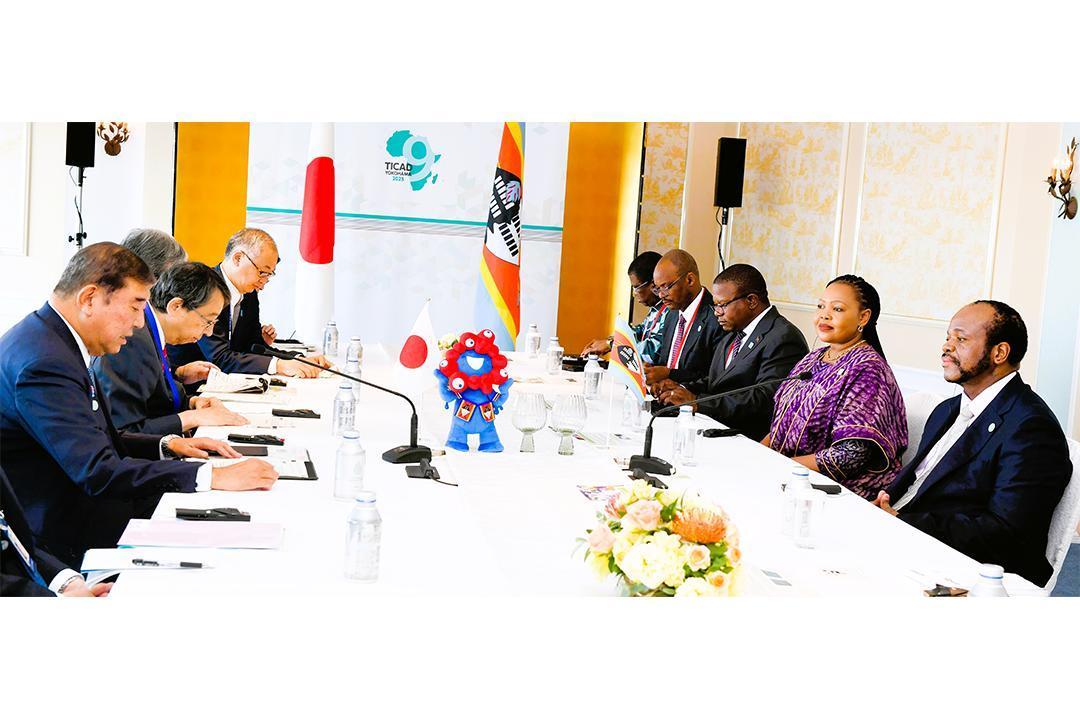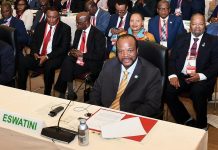Africa-Press – Eswatini. His Majesty the King has praised Japan for its development assistance to Africa, particularly Eswatini.
He described it as a vital link between the developed nation and the African continent, offering valuable experiences to accelerate national growth ambitions.
Speaking at a bilateral meeting with Japan’s Prime Minister, Shigeru Ishiba, yesterday, the discussions centred on strengthening bilateral relations and exploring ways to enhance trade and development.
His Majesty noted that TICAD arrived at an opportune time, as Africa charts its future through Agenda 2063, aimed at creating the ‘Africa we want’.
“Whilst we pursue this continental agenda, each nation has specific goals. Eswatini is striving to improve the lives of all citizens by building a robust social sector,” he said.
“We are recovering from the adverse effects of the COVID-19 pandemic, which severely impacted many economies. Our progress is encouraging, with our economy recently recording an eight per cent GDP growth, with potential for further expansion,” he added.
His Majesty expressed Eswatini’s gratitude to Japan for its openness to engagement and support, which is crucial for nations striving to grow.
Japan’s Prime Minister welcomed His Majesty, expressing his desire to deepen the relationship between the two nations. In a brief statement from Japan’s Foreign Affairs Ministry, Prime Minister Ishiba, noting His Majesty King Mswati III’s sixth TICAD participation, expressed gratitude for his involvement over more than a quarter of a century.
He emphasised strengthening ties, acknowledging their respective traditions, heritages, and unique cultures.
Prime Minister Ishiba highlighted challenges Japan faces and announced food assistance to address worsening food insecurity caused by drought and other factors.
He also affirmed Japan’s commitment to supporting youth capacity building through human resource development, for which His Majesty expressed gratitude.
The leaders pledged to collaborate on various international challenges.
His Majesty was accompanied by the Minister for Foreign Affairs and International Cooperation, Pholile Shakantu; Natural Resources and Energy Minister, Prince Lonkhokhela; Economic Planning and Development Minister, Dr Tambo Gina; and Commerce, Industry and Trade Minister, Manqoba Khumalo.
Also present were Ambassadors Menzi Dlamini, designated to Malaysia, Mahlaba Mamba, designated to the African Union (AU), and the King’s Private Secretary, Mbongeni Simelane.
INKHOSIKATI VISITS ANCIENT JAPANESE GARDEN, YOKOHAMA STRAWBERRY PARK
YOKOHAMA, JAPAN – Japan’s First Lady, Yoshiko Ishiba, led Inkhosikati LaMatsebula and several spouses of African leaders to the historic Sankeien Garden and Yokohama Strawberry Park for a strawberry-picking experience.
Among the First Ladies were Angola’s Ana Afonso Dias Lourenço, Kenya’s Rachel Ruto, Mozambique’s Gupta Candane Chapo, Cameroon’s Felicite Nelly Ngoute, Burundi’s Angelina Ndayishimiye, and Dr Max Malumango, spouse of Zambia’s Vice President, among others.
Accompanying Inkhosikati was Princess Siphila, the Queen Mother of the Ndzundza Mabhoko clan of Ndebele, a sister to His Majesty the King, who wore a South African Ndebele-inspired outfit.
At Sankeien Garden, Inkhosikati enjoyed a Noh theatre performance of “The Feather Mantle,” a tale of a fisherman, Hakuryo, who finds a celestial maiden’s robe on a pine branch. When she pleads for its return to ascend to heaven, he agrees on the condition that she performs a celestial dance, which she does gracefully, portraying the Palace of the Moon, before vanishing into the mist beyond Mount Fuji.
Inkhosikati and the First Ladies were taught to play Noh drums and sing, guided by professional musicians.
Noh, recognised as the world’s oldest theatrical tradition and a UNESCO Intangible Cultural Heritage, features distinctive masks believed to hold spiritual power, influencing the performer’s appearance and inner state.
First Lady Ishiba hosted lunch, introducing the spouses to an excerpt of the Japanese tea ceremony, Sado, where they tasted authentic Matcha tea.
Inkhosikati and the First Ladies then visited Yokohama Strawberry Park to pick strawberries. Unique to the park, strawberries are carefully grown by individuals with disabilities, guided by cultivation experts. Inkhosikati LaMatsebula, Princess Siphila and the First Ladies enjoyed picking and tasting the fresh, juicy fruit.
Opened in April 2022, the park aims to create employment opportunities for people with disabilities, fostering their independence and societal participation.
It promotes an inclusive, equitable environment, assessing individuals daily to assign tasks suited to their physical conditions.
ESWATINI SEEKS ENERGY PARTNERSHIPS IN JAPAN
YOKOHAMA, JAPAN – Eswatini is not only aiming to boost trade with Japan but is also seeking partnerships to invest in its energy sector.
In a media interview at the Ninth Tokyo International Conference on African Development, the Minister for Commerce, Industry and Trade, Manqoba Khumalo, highlighted the value of bilateral relations with Japan, which have yielded positive results for Eswatini.
He cited the presence of YKK Zippers, a Japanese multinational operating in Eswatini for half a century. Recently, several Japanese firms, including a tractor manufacturing company, have explored setting up businesses in the kingdom.
The minister said Eswatini’s participation in TICAD 9 involves meetings with potential partners on key development areas, particularly energy supply, a critical need. He noted that Japanese companies could collaborate with the Eswatini Electricity Company (EEC). Natural Resources and Energy Minister, Prince Lonkhokhela, part of the delegation, held talks with these firms, with discussions set to continue.
“We are exploring a public-private partnership model involving our governments and Eswatini’s private sector,” he said.
Khumalo added that engagements also focus on developing infrastructure projects under Japan’s development and trade programmes.
“Additionally, we are addressing trade expansion, particularly exports to Japan. Currently, our main export is wood chips from TWK in Pigg’s Peak, Montigny, and Shiselweni Forestry,” he said.
The minister noted Japan’s interest in importing anthracite coal from Eswatini, which could open a new market amid challenges in South Africa’s coal sector, where smelters are closing, forcing Maloma, a major Eswatini coal mine, to scale down and announce retrenchments.
Khumalo stressed that Eswatini is not satisfied with current trade volumes and his ministry is committed to growth.
“His Majesty has tasked us to engage beyond formal meetings with Japan’s industry leaders. The Eswatini Investment Promotion Authority (EIPA) is showcasing the kingdom’s offerings at a dedicated stand,” he said.
For More News And Analysis About Eswatini Follow Africa-Press







